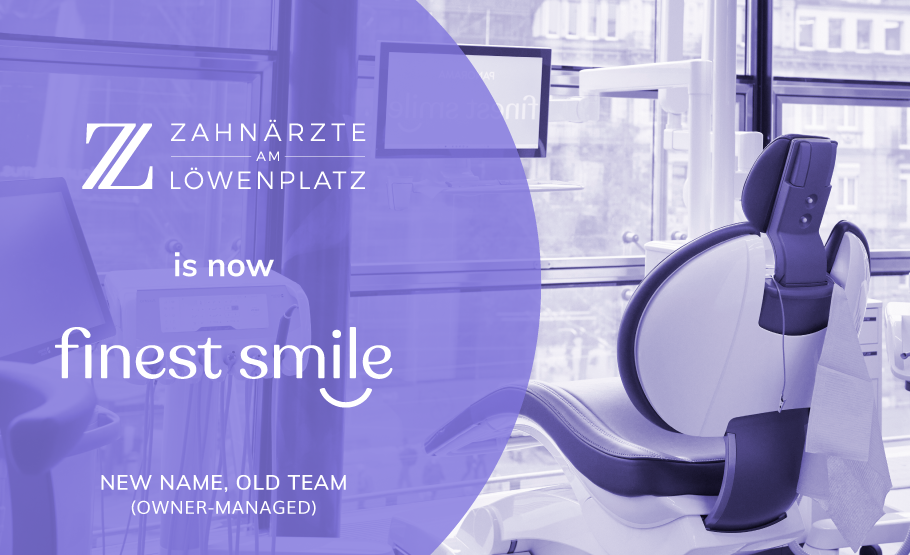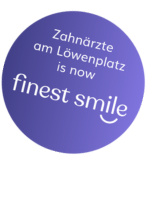
Facts about CMD treatment
| Definition: | Craniomandibular dysfunction Dysfunction of the masticatory apparatus |
| When suitable: | to alleviate acute complaints or prevent consequential damage such as damage to the joint, chewing/neck/shoulder muscles or teeth |
| Duration: | depending on the scope and cause of treatment |
| Costs: | Proportional coverage by Swiss health insurance possible |
What is CMD treatment?
Chewing and speaking are essential functions that we rely on in our everyday lives. The craniomandibular system is responsible for ensuring that these functions work properly. This comprises the upper and lower jaw, the temporomandibular joints and the masticatory muscles. The individual elements are optimally coordinated in a healthy masticatory system. If this is not the case and there is a disorder, this is referred to as craniomandibular dysfunction.
Frequently asked questions about CMD treatment
How can jaw problems affect the body?
Impairments of the chewing apparatus can permanently transfer complaints to the rest of the body. For example, misalignments of the temporomandibular joint can also be responsible for back, shoulder, hip or knee pain. Side effects like headaches, migraine attacks and tinnitus can also be observed and associated.
What symptoms indicate CMD?
Craniomandibular dysfunction can be based on a very unspecific clinical picture. The symptoms vary from patient to patient, which often means that the condition is not recognized until years later. CMD patients often suffer from head, neck or shoulder pain or muscle tension. They often also suffer from swallowing disorders, teeth grinding, jaw clicking, migraines, tinnitus or pain when chewing.
Can CMD treatments improve the condition in the long term?
Thanks to our holistic approach, we can work together with the patient to alleviate the symptoms in the long term. However, we don't just want to eliminate the symptoms, but also the cause, as this is the only way to ensure lasting treatment success.
Is physiotherapy always necessary as an accompanying measure?
Craniomandibular dysfunction is often accompanied by impairments outside of the chewing apparatus, such as tension or misalignments in the shoulder or hip area. To prevent or treat these, we often advise our patients to undergo physiotherapy as an accompanying measure.
We also work closely together with specialists in physiotherapy and osteopathy.
Does health insurance cover the costs of CMD treatments?
CMD treatments can be very extensive, but health insurance companies cover most of the costs of treatment. Only the dental costs for the Michigan aligner need to be covered by the patient. Diagnostics and other steps of the treatment are actually covered by general Swiss dental insurances. Our dental technician will make this bite splint precisely individually for you and you can expect to pay around CHF 750 (private amount of treatment costs).
Your advantages of CMD treatment in our practice

- 20 years+ of dental experience
- Modern clinic with air conditioning
- Comfortable state of the art dental treatment chairs with massage function
- 2D/3D Xrays for precice diagnostics and low radiation
- Enjoy your favorite Netflix program during treatment
- Swiss made local dental technician individually make the Michigan aligner for you for a perfect fit
Symptoms of craniomandibular dysfunction
How CMD manifests itself varies from patient to patient and cannot initially be generalized. However, the most common symptoms are headaches and jaw pain, teeth grinding, but also ringing in the ears or migraines. These symptoms can be triggered not only by physical but also by psychological impairments, such as constant stress. Patients with CMD often also suffer from restricted mobility or tension in the neck muscles.
As the symptoms and causes of craniomandibular dysfunction can vary greatly, it is all the more important to draw up a suitable treatment plan. On the one hand, acute symptoms must be alleviated, on the other hand, the disorder should be resolved in the long term. This is why we at our dental practice in Zurich attach great importance to taking a holistic approach to our patients, taking all possible factors into account. In addition to tooth correction, we also use functional therapy using Michigan splints / Michigan aligners or ceramic bite elevation with Veneers, Vonlays and Onlays, as well as medical approaches or physical and psychotherapeutic procedures.
Many patients often suffer from their symptoms for a long time before medical clarification provides relief. The diagnosis of CMD is often only made after several years, meaning that those affected suffer a great deal of long-term discomfort. The correct diagnosis offers the opportunity to create an individually tailored treatment plan and permanently alleviate the symptoms.
CMD treatment procedure
It is particularly important to us to take plenty of time for a detailed diagnosis in order to determine the exact degree of the CMD. In our opinion, this is the only way to find a suitable therapy from which the patient can benefit in the long term. To ensure this, we carry out a functional analysis at our dental practice in Zurich. After this analysis, we can begin the treatment.
A common immediate treatment that can also be used in the long term is the so-called Michigan bite splint or Michigan aligner. Of course, we manufacture these individually for you. The duration of wear is determined by the severity of the CMD. In some cases, it is sufficient to wear the aligner either at night or during the day. However, patients who are more severely affected should wear the aligner all the time.
If the bite splint does not achieve the hoped-for success, we can determine the next steps in consultation with you. With our interdisciplinary and holistic approach, we have the opportunity to tailor the treatment to your personal needs. This is why we work together with kinesiology experts and physio therapists and Osteopaths, for example. With this addition to traditional dentistry, we can analyze existing tension in the body and aim for a balance of relaxation and strength.
Special jaw, neck and shoulder exercises, which relax and strengthen the jaw muscles, are particularly suitable. However, the limbic system is also addressed by kinesiological treatment, for example through aroma or fragrance therapy or relaxation of the central nervous system. A psychological approach can also help to work through stressful issues or strengthen resilience in everyday life.
Kinesiology
The balance of body and mind is at the heart of the kinesiology therapy approach. Injuries, stress or even accidents can influence tensions at a physical level, which can have negative effects at a mental and physical level.
Kinesiology offers a holistic therapeutic approach to resolving these blockages.
For the specific treatment of CMD this means:
- Relaxation of the jaw and surrounding muscular structures through manual therapy
- Calming of the vegetative nervous system through emotional process support
- Exercises for the jaw for integration into everyday life
The entire muscular structures of the body are included in the treatment

Applied Kinesiology with Diego Robert
Before Diego Robert decided to work in the field of kinesiology, he worked for several years in industrial engineering, in which he had previously completed a bachelor's degree.
After finding his interest in kinesiology, he finally completed a three-year training course as a holistic kinesiologist at the APAMED college. There he learned a combination of the knowledge of general medicine, psychology and kinesiology and gained practical experience in dealing with patients. In order to pass on this experience and his skills, Diego Robert decided to set up his own kinesiology practice in Zurich.
More about Diego Robert
Thanks to ongoing further training, Mr. Robert is always up to date with the latest developments in kinesiology. To complement our range of services in our dental practice in Zurich, we are happy to recommend our patients with a corresponding clinical picture to Diego Robert for holistic, kinesiological treatment.
Further trainings of Diego Robert:
- Integrated NeuroGastroEnterology, Chinese Medicine's Syndromes, Integrated Neurocardiology (IAK Forum International, Kirchzarten, Germany)
- Integrated Physiology (Vida kinesiologia, Barcelona, Spain)
- Chinese medicine as body-based psychotherapy (Ben Shen School, Zurich, Switzerland)
Contact us
Zahnärzte am Löwenplatz
Seidengasse 20
8001 Zürich
Opening times
Monday - Friday: 7:00 am to 8:00 pm
NEW!
Zahnärzte am Löwenplatz Panorama
Seidengasse 20
8001 Zürich
on the third floor, elevator available.










